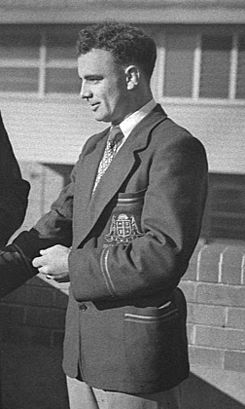Clive Churchill facts for kids

Churchill in 1952
|
|||||||||||||||||||||||||||||||||||||||||||||||||||||||||||||||||||||||||||||||||||||||||||||||||||
|
Personal information
|
|||||||||||||||||||||||||||||||||||||||||||||||||||||||||||||||||||||||||||||||||||||||||||||||||||
|---|---|---|---|---|---|---|---|---|---|---|---|---|---|---|---|---|---|---|---|---|---|---|---|---|---|---|---|---|---|---|---|---|---|---|---|---|---|---|---|---|---|---|---|---|---|---|---|---|---|---|---|---|---|---|---|---|---|---|---|---|---|---|---|---|---|---|---|---|---|---|---|---|---|---|---|---|---|---|---|---|---|---|---|---|---|---|---|---|---|---|---|---|---|---|---|---|---|---|---|
| Full name | Clive Bernard Churchill | ||||||||||||||||||||||||||||||||||||||||||||||||||||||||||||||||||||||||||||||||||||||||||||||||||
| Born | 21 January 1927 Newcastle, New South Wales, Australia |
||||||||||||||||||||||||||||||||||||||||||||||||||||||||||||||||||||||||||||||||||||||||||||||||||
| Died | 9 August 1985 (aged 58) Sydney, New South Wales, Australia |
||||||||||||||||||||||||||||||||||||||||||||||||||||||||||||||||||||||||||||||||||||||||||||||||||
|
Playing information
|
|||||||||||||||||||||||||||||||||||||||||||||||||||||||||||||||||||||||||||||||||||||||||||||||||||
| Height | 175 cm (5 ft 9 in) | ||||||||||||||||||||||||||||||||||||||||||||||||||||||||||||||||||||||||||||||||||||||||||||||||||
| Weight | 76 kg (12 st 0 lb) | ||||||||||||||||||||||||||||||||||||||||||||||||||||||||||||||||||||||||||||||||||||||||||||||||||
| Position | Fullback | ||||||||||||||||||||||||||||||||||||||||||||||||||||||||||||||||||||||||||||||||||||||||||||||||||
|
|||||||||||||||||||||||||||||||||||||||||||||||||||||||||||||||||||||||||||||||||||||||||||||||||||
|
Coaching information
|
|||||||||||||||||||||||||||||||||||||||||||||||||||||||||||||||||||||||||||||||||||||||||||||||||||
|
|||||||||||||||||||||||||||||||||||||||||||||||||||||||||||||||||||||||||||||||||||||||||||||||||||
Clive Bernard Churchill (21 January 1927 – 9 August 1985) was an amazing Australian rugby league player and coach. He was known as "The Little Master" because he was so good at the game. Clive played most of his club games for the South Sydney Rabbitohs. He also coached them later on.
Clive won five major championships, called "premierships", as a player. He then won three more as a coach. He played more games for the Australian Kangaroos team than anyone else at the time. Many people think he is one of the greatest rugby league players ever. There's even a special award named after him, the Clive Churchill Medal. It's given to the best player in the NRL Grand Final each year. Clive was famous for his exciting way of playing. He really changed how the fullback position was played.
Contents
Early Life and Rugby League Beginnings
Clive Churchill was born in Newcastle, New South Wales. He was a talented schoolboy player at Marist Brothers school in Hamilton. While at school, he helped his team win five premierships.
In 1946, Clive started playing for the Central team in the Newcastle Rugby League. He quickly caught the eye of scouts from Sydney. He then joined the South Sydney team in 1947.
Clive Churchill's Amazing Playing Career
Clive Churchill became a star player for South Sydney. He was a fullback, which is a key position in rugby league.
Winning Championships with South Sydney
In 1949, South Sydney played in the Grand Final but lost. The next year, in 1950, they won the Grand Final against Western Suburbs. Clive was the fullback in that winning team.
In 1951, South Sydney won their second championship in a row. Clive played fullback and even scored a try in the final game. He missed the 1952 Grand Final because he was on a special tour to England with the Australian team.
South Sydney kept winning! In 1953, they won their third championship in a row. Clive was the fullback and helped his team win. In 1954, they won again, beating Newtown in the first Grand Final that was required to decide the champion.
Clive even played a game in 1955 with a broken arm! He kicked a winning goal after the game ended, with his arm wrapped up. This showed how tough and dedicated he was.
International and State Games
Clive Churchill was chosen to be the captain of the Australian team in the first-ever 1954 Rugby League World Cup. He played his last game for Australia in 1956.
He played for South Sydney for 12 seasons. During that time, he played 164 games and won five premierships: in 1950, 1951, 1953, 1954, and 1955.
Clive played 34 games for Australia. He was captain in 24 of those games. He also played 37 games for the New South Wales team, which is still a record for the state.
After leaving South Sydney, Clive played and coached for the Norths team in Brisbane in 1959. He helped them win a championship there too. He officially stopped playing at the end of that year.
Clive Churchill's Coaching Success
Clive Churchill was also a very successful coach. He was known for his smart strategies and leadership.
Coaching the Australian Team
In 1959, Clive was chosen to coach the Australian national team. He led them on a tour where they played against teams from Great Britain and France.
Leading South Sydney to More Wins
In 1967, Clive became the coach of the South Sydney Rabbitohs. He had an immediate impact! South Sydney won the championship in his very first year as coach.
He led the South Sydney team to win four championships in five years, between 1967 and 1971. This was an amazing achievement. Clive stopped coaching South Sydney in 1975.
He also coached the Queensland team and the Australian team, having great success with them too. Clive Churchill is remembered as one of Australia's most successful rugby league coaches.
Honours and Legacy
Clive Churchill received many special honours for his contributions to rugby league.
- In 1985, he was given the Order of Australia award. This was for his great service to sport and the community.
- Also in 1985, he was named one of the first four "Immortals" of Australian rugby league. This means he is considered one of the absolute best players ever.
- In 1986, a new stand at the Sydney Cricket Ground was named the Clive Churchill Stand in his honour.
- The Clive Churchill Medal was created in 1986. It is given to the best player in the NRL Grand Final each year.
- In 2002, Clive was added to the Australian Rugby League Hall of Fame. He was also named in the South Sydney Team of the Century.
- In 2008, he was named in the list of Australia's 100 Greatest Players. He was also chosen as the fullback in the Team of the Century.
Clive Churchill's legacy lives on through these awards and honours. He is remembered as a true legend of rugby league.
See also
- Clive Churchill Medal
 | Dorothy Vaughan |
 | Charles Henry Turner |
 | Hildrus Poindexter |
 | Henry Cecil McBay |

